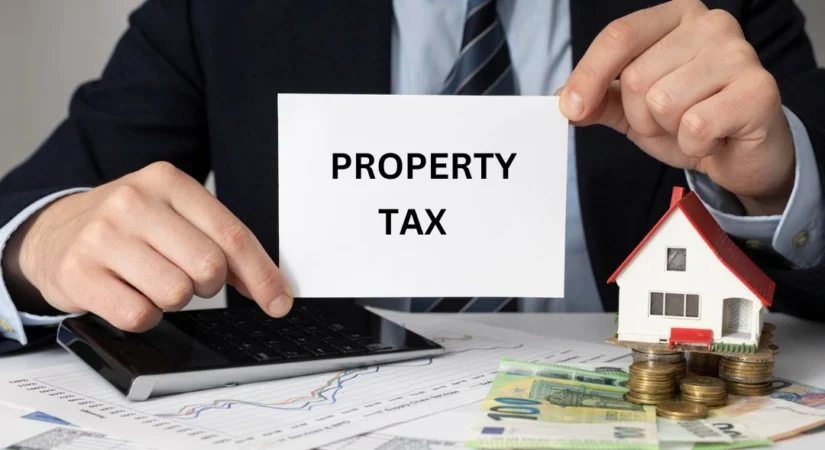Understanding the complexities of property tax deductions can be challenging for homeowners in Detroit. As people seek financial relief, a frequent question arises: is property tax deductible in Michigan? Sorting through tax laws and qualifications can feel like a daunting task.
Michigan allows property tax deductions under certain conditions. The process might seem complicated, but staying organized and knowing the requirements can help. With the right approach, claiming these deductions becomes easier, and you can enjoy the benefits.
In this guide, we’ll simplify property tax deductions for homeowners. Learn how to navigate the process and make the most of the tax benefits available to you.
Understanding Property Tax Deduction and Qualifications for Eligibility
A property tax deduction allows homeowners to reduce their taxable income by the amount they pay in property taxes. This deduction helps lower your overall tax burden, potentially saving you money during tax season. To be eligible for this deduction, you must meet specific requirements based on your property and tax situation. AmeriHome suggests some of the most cited qualifications of eligibility:
Federal Tax Requirement
Homeowners can claim property tax deductions on their federal returns by itemizing deductions on Schedule A (Schedule A is an IRS form 1040, used to claim itemized deductions). The property taxes must be related to qualifying properties like your primary residence or other eligible properties you own. In addition, only the amount paid in the tax year is deductible.
Michigan-Specific Rules
The state offers special programs for homeowners that allow for property tax reductions. These programs include credits and exemptions, and homeowners must meet certain eligibility criteria to qualify for these tax-saving opportunities.
- Homestead Property Tax Credit: The Homestead Property Tax Credit offers relief to Michigan homeowners who meet income limits and other qualifications stated in MCL 206.520. If eligible, this credit can reduce the amount of property taxes owed, providing valuable savings for qualifying individuals.
- Principal Residence Exemption (PRE): Homeowners who live in their property as their primary residence can qualify for the Principal Residence Exemption as stated in General Property Tax Act 211.7cc. This exemption can exclude them from paying the school operating tax portion of their property taxes, reducing their overall tax burden.
- Michigan Property Tax Refund for Seniors and Disabled Homeowners: Seniors aged 65 and older, along with disabled homeowners, may qualify for additional property tax relief through Michigan’s state programs. These programs aim to help seniors and disabled individuals manage their property tax costs.
Which Properties Are Eligible for Tax Deductions?
Property tax deductions can apply to various properties, but not all types are eligible. Understanding which properties qualify and how to claim deductions can help homeowners reduce their tax liability. Let’s discuss some of the properties that may be eligible for deductions:
Primary Residence
The property you live in as your main home is typically eligible for property tax deductions. It includes the taxes you pay on the land and structures where you reside. Ensure that the property is your primary residence to qualify for this deduction.
Vacation Homes and Second Properties
Vacation homes and second properties might be eligible for deductions, but the rules can be more complicated. You can often deduct property taxes on these properties if you itemize your deductions, but they are subject to stricter requirements.
Rental and Investment Properties
Rental and investment properties are generally eligible for property tax deductions. You can deduct the property taxes you pay on these properties as part of your business expenses. It will lower the taxable income generated from your rental property or investment portfolio.
Business Properties
Business property owners can deduct property taxes on buildings or land used for business operations. These deductions can be applied to both real estate and personal property, provided the property is used solely for business purposes.
How to Claim a Property Tax Deduction

Claiming a property tax deduction is a straightforward process, but it requires a bit of organization. By following a few simple steps, you can get the full benefit of your property tax payments. Here’s how to claim the deduction efficiently.
Find Your Tax Records
Start by gathering your tax records, such as property tax statements or receipts. These documents prove the property taxes you’ve paid during the year. They are essential for claiming the deduction.
Exclude the Stuff That Doesn’t Count
When calculating your property tax deduction, ensure you exclude any non-deductible fees. It may include special assessments for local improvements or non-property tax charges like garbage collection fees.
Use Schedule A When You File Your Return
To claim your property tax deduction, you’ll need to use Schedule A, which allows you to itemize your deductions. This form helps you list and total all deductible expenses, including property taxes, for the year.
Deduct Your Property Taxes for the Year You Pay Them
Make sure you claim your property tax deductions in the same year you paid the taxes. Even if taxes were assessed in one year but paid the next, only include taxes paid for the year you’re filing for.
Common Mistakes to Avoid When Filing
Property tax deductions are a great way to save money, but filing mistakes can undermine those savings. Avoid these common errors to ensure you get the full benefit of your deductions:
Not Itemizing Deductions
Skipping itemization could cost you valuable deductions. If your expenses, including property taxes, are higher than the standard deduction, consider itemizing. Use Schedule A to maximize your savings.
Failing to Stay Within SALT Limits
The State and Local Tax (SALT) deduction has a limit of $10,000. Forgetting this cap when adding up property and income taxes can lead to errors in your filing and potential complications.
Missing Local Property Tax Payments
Local tax payments are easy to overlook, especially if you pay them separately. Ensure all payments made to city or county authorities are included in your deductions.
Overlooking Michigan-Specific Tax Credits
Michigan offers unique tax credits like the Homestead Property Tax Credit. Not exploring these options might result in higher tax bills. Always review state-specific benefits before filing.
Incorrectly Reporting Property Tax Amounts
Mistakes in reporting the amount of property taxes paid can lead to delays or audits. Cross-check your records to ensure accurate reporting on your tax return.
Conclusion
The process of claiming property tax deductions can be tricky for homeowners, with various qualifications, limits, and state-specific rules to navigate. Without clear guidance, it’s easy to miss out on potential savings or make costly errors in your filing.
Don’t let the complexities of tax deductions stress you out. Our professional property manager can simplify the process, ensuring you claim every deduction and credit you’re entitled to.
Frequently Asked Questions
Are property taxes paid by mortgage escrow accounts deductible in Michigan?
Property taxes paid through escrow accounts are deductible as long as the taxes are paid to the taxing authority within the taxable year. Homeowners should check escrow statements for accurate records.
How do special assessments or local benefit taxes affect property tax deductions?
Special assessments for improvements such as sidewalks or sewer lines are generally not deductible unless they are for maintenance or repairs, not permanent improvements.
Are property taxes deductible if the homeowner rents out part of their residence?
Property taxes are partially deductible for the rental portion of a residence, calculated based on the percentage of the property used for rental purposes.



